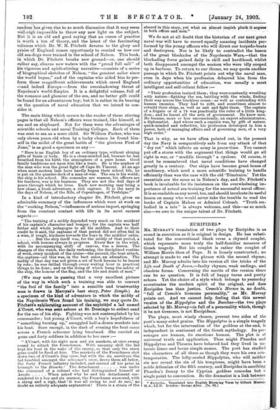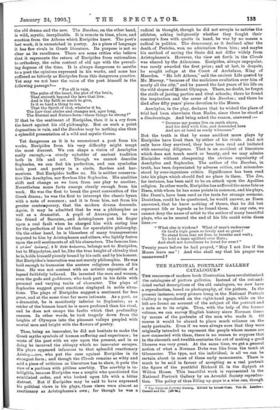EURIPIDES.*
Mn. MURRAY'S translation of two plays by Euripides is as sound in execution as it is original in design. He has substi- tuted for the conventional blank verse a rhymed couplet, which represents more truly the half-familiar measure of Greek tragedy. But his couplet is rather the couplet of William Morris than of Pope. It is loosely constructed ; no attempt is made to end the phrase with the second rhyme; and Mr. Murray admits into his version all the tricks of the Life and Death of Jason,—faulty rhymes, weak endings, and obsolete forms. Concerning the merits of the version there can be no question. It is full of happy turns and pretty echoes. Yet the choice of a style which belongs to yesterday accentuates the modern spirit of the original, and does Euripides less than justice. Creech's Horace is, no doubt, " full of Creech's tiresome personality," as Mr. Murray points out. And we cannot help feeling that this newest version of the Hippolytus and the Bacchae-7the_ two plays selected by Mr. Murray—is full of a personality which, though it be not tiresome, is not Euripidean.
The plays, most .wisely chosen, present two sides of the poet's many-sided genius. The Hippolytus is a simple tragedy which, but for the intervention of the goddess at the end, is independent in sentiment of the Greek mythology. Its per- sonages are human, its emotions human. The plot is of universal truth and application. Thus might Phaedra and Hippolytus and Theseus have behaved had they lived in un- heroic times and borne simple names. The poet has studied the characters of all three as though they were his own con- temporaries. The lofty-souled Hippolytus, who will neither sin nor reveal the sin of his temptress, might have been a noble Athenian of the fifth century, and Euripides in ascribing, Phaedra's frenzy to the Cyprian goddess concedes but ,1 single point to convention. So the dramatist is a link betwee..
• Euripides. Translated into English Rhyming Verse by Gilbert Murray, M.A., LL.D. London : George Allen. Ds. W.)
the old drama and the new. The Bacchae, on the other hand,
is wild, mystic, inexplicable. It is remote in time, place, and emotion from the Athens which Euripides knew. The poet's last work, it is unmatched in poetry. As a piece of language it has few rivals in Greek literature. Its purpose is not so clear as its excellence. There are some critics who believe that it represents the return of Euripides from rationalism to orthodoxy, the calm content of old age with the prevail- ing dogmas of the time. It is always dangerous to ascribe to a poet the opinions expressed in his works, and none has suffered so bitterly as Euripides from this dangerous practice.
Yet may we not hear the voice of the poet himself in the following passage ?— "For all is vain, The pulse of the heart, the plot of the brain,
That striveth beyond the laws that live.
And is thy faith so much to give, Is it so hard a thing to see, That the Spirit of God, whate'er it be, The Law that abides and changes not, ages long, The Eternal and Nature-born—these things be strong ?"
If that be the sentiment of Euripides, then it is a cry from the heart against his old philosophy. But on such a point dogmatism is vain, and the Bacchae may be nothing else than a splendid presentation of a wild and mystic theme.
Yet dangerous as it is to reconstruct a poet from his works, Euripides from his very difficulty might tempt the most discreet. We can shape a vision of Aeschylus easily enough,—a sturdy upholder of ancient tradition both in life and art. Though we cannot describe Sophocles, we can feel his perfection, and can symbolise both poet and poetry in a circle, flawless and har- monious. But Euripides baffles us. He is neither conserva- tive like Aeschylus, nor flawless like Sophocles. His qualities shift and change as we turn from one play to another. Nevertheless some facts emerge clearly enough from his work. He was the first to break the great convention of the Greek drama; he was the first to interrupt the classic hymn with a note of romance ; and it is from him, not frcm his greater contemporary, that the modern drama descends.
Again, it may be admitted that he was a philosopher as well as a dramatist. A pupil of Anaxagoras, he was
the friend of Socrates,. and Aristophanes put his finger upon a real fault when he charged him with caring less for the perfection of his art than for speculative philosophy.
On the other hand, he is blameless of many transgressions imputed to him by Aristophanes and others, who lightly fasten upon the evil sentiments of all his characters. The famous line.
yAidfro' 4/41.44,ox', cppOr icvle/Aaroc, belongs not to Euripides,
but to Hippolytus, and he, like the true knight of chivalry that he is, holds himself piously bound by his oath and by his honour. But Euripides's innovation was not merely philosophic. He was bold enough to humanise the austere religious drama of his time. He was not content with an artistic exposition of a legend faithfully believed. He invested the men and women, even the gods and goddesses, who took part in his fable with personal and varying traits of character. The plays of Sophocles suggest great emotions displayed in noble situa- tions. The plays of Euripides suggest a sentiment far less great, and at the same time far more intimate. As a poet, as a dramatist, he is manifestly inferior to Sophocles ; as a reader of the:human heart he is more profound than his rival, and he does not escape the faults which that profundity ensures. In other words, he took tragedy down from the heights of Olympus into the pleasant valleys peopled with mortal men and bright with the flowers of poetry.
Thus, being an innovator, be did not hesitate to make the Greek myths symbols of human suffering and experience ; he wrote of the past with an eye upon the present, and in so doing he incurred the obloquy which no innovator escapes.
His plays appeared infamous to that splendid reactionary
Aristopu.nes, who put the case against Euripides in its strongest form ; and though the Clouds remains as witty and
acid a piece of criticism as literature has to show, it puts the view of a partisan with pitiless acerbity. The acerbity is in- telligible, because Euripides was a sceptic who questioned the established order, and who looked upon life with a bitter distrust. Bat if Euripides may be said to have expressed his political views in his plays, those views were almost as reactionary as Aristophanes's own ; for though he was a radical in thought, though he did not scruple to satirise the athletes, asking indignantly whether they fought their country's foes with quoits in hand, he was by no means a radical in politics. The democracy, as it declined after the
death of Pericles, won no admiration from him; and maybe his method of saving the State did not differ widely from Arietophanes's. However, the view set forth in the Clouds was shared by the Athenians. Euripides, always unpopular, was rarely awarded the first prize ; and at last, in despair,
he sought refuge at the Court of Archelaus, King of Macedon. " He left Athens," said the ancient Life quoted by Mr. Murray, "because of the malicious exultation over him of nearly all the city," and he passed the last years of his life on the wild slopes of Mount Olympus. There, no doubt, he forgot the strife of jarring parties and rival schools ; there he found
the inspiration and the scene of his Bacchae ; and there he died after fifty years' pious devotion to the Muses.
Aeschylus, in the play, declares that he wished the place of trial had been elsewhere than Hades, since there he stood at a disadvantage. And being asked the reason, answered :-
"Because my poems live on earth above, And his died with him, and descended here And are at hand as ready witnesses."
But the truth is that by some accident more plays by Euripides have lived than by either of his rivals. And not only have they survived, they have been read and imitated with unceasing diligence. That is an accident of literature which does not touch merit or beauty, and we may admire Euripides without cheapening the obvious superiority of
Aeschylus and Sophocles. The author of the Bacchae, in truth, has been depreciated by adverse critics, and misunder- stood by over-ingenious critics. Significance has been read into his plays which should find no place in them. The Ion,
for instance, has been said to be an attack upon the Apolline religion. In other words, Euripides has suffered the same fate as Ibsen, with whom he has some points in common, and his plays, like Ibsen's, have been used as the texts for strange sermons.
Doubtless, could he be questioned, he would answer, as Ibsen answered, that he knew nothing of theses, that he did but represent life or legends as he found them. At any rate, we cannot deny the name of artist to the author of many beautiful
plays, who as he neared the end of his life could write these lines:— "What else is wisdom? What of man's endeavour Or God's high grace so lovely and so great ? To stand from fear set free, to breathe and wait ; To hold a hand uplifted over Hate;
And shall not Loveliness be loved for ever? "
Twenty years before he had prayed, "May I not live if the Muses leave me " ! And who shall say that his prayer was unanswered P







































 Previous page
Previous page